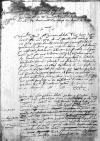Hac hora legimus cf. Paweł PŁOTOWSKI to Ioannes DANTISCUS Frauenburg (Frombork), 1539-08-17, CIDTC IDL 2213⌊litterascf. Paweł PŁOTOWSKI to Ioannes DANTISCUS Frauenburg (Frombork), 1539-08-17, CIDTC IDL 2213⌋ Fraternitatis Vestrae, quae ob id gratae nobis erant, quod illam ex suis aegritudinibus convaluisse significabant. Probamus item, quod ex infecto aere in salubriorem se conferre statuerit. Libenter hic Fraternitatem Vestram vidissemus, verum cum sic res tulerit, utrimque bene consulere cogimur.
Ex curia nostra nova in dies exspectamus. Serenissima Sigismund I Jagiellon (Zygmunt I) (*1467 – †1548), King of Poland and Grand Duke of Lithuania (1506-1548); Duke of Głogów (Glogau) (1499-1506), Duke of Opava (1501-1506), Governor of Silesia (1504-1506); son of King Kazimierz IV Jagiellon and Elisabeth of Austria⌊maiestas regiaSigismund I Jagiellon (Zygmunt I) (*1467 – †1548), King of Poland and Grand Duke of Lithuania (1506-1548); Duke of Głogów (Glogau) (1499-1506), Duke of Opava (1501-1506), Governor of Silesia (1504-1506); son of King Kazimierz IV Jagiellon and Elisabeth of Austria⌋ cf. Sigismund I Jagiellon to Ioannes DANTISCUS Cracow, 1539-06-20, CIDTC IDL 6876;
Sigismund I Jagiellon to Ioannes DANTISCUS Cracow, 1539-07-05, CIDTC IDL 5697⌊transtulitcf. Sigismund I Jagiellon to Ioannes DANTISCUS Cracow, 1539-06-20, CIDTC IDL 6876;
Sigismund I Jagiellon to Ioannes DANTISCUS Cracow, 1539-07-05, CIDTC IDL 5697⌋ Provincial Diet of Royal Prussia ⌊conventum praeteritumProvincial Diet of Royal Prussia ⌋ ad futurum 1539-09-29⌊Sancti Michaelis festum1539-09-29⌋ ea lege, ut Council of Royal Prussia the most important local authority in Royal Prussia. It consisted of two bishops (of Ermland (Warmia), who served as the Council’s president, and of Kulm (Chełmno)), three voivodes (of Kulm, Marienburg (Malbork), and Pomerania), three castellans (of Kulm, Elbing (Elbląg), and Gdańsk (Danzig)), three chamberlains (of Kulm, Marienburg, and Pomerania), and representatives of the three Great Prussian Cities – Gdańsk, Thorn (Toruń), and Elbing (ACHREMCZYK 2016, p. 17-18)⌊domini consiliariiCouncil of Royal Prussia the most important local authority in Royal Prussia. It consisted of two bishops (of Ermland (Warmia), who served as the Council’s president, and of Kulm (Chełmno)), three voivodes (of Kulm, Marienburg (Malbork), and Pomerania), three castellans (of Kulm, Elbing (Elbląg), and Gdańsk (Danzig)), three chamberlains (of Kulm, Marienburg, and Pomerania), and representatives of the three Great Prussian Cities – Gdańsk, Thorn (Toruń), and Elbing (ACHREMCZYK 2016, p. 17-18)⌋ de loco peste non suspecto designando sint solliciti. Qui hac tempestate non facile reperiri poterit ob hominum ex viciniis infectis confluentiam, sine quibus comitia nequeunt transigi. Hoc, quod paulopost in eo constituetur, Fraternitatem Vestram non praeteribit.
Quam bene valere optamus.

 AAWO, AB, D. 7, f. 92r
AAWO, AB, D. 7, f. 92r